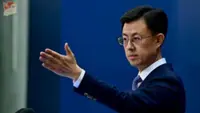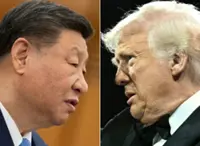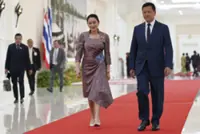
Jokow takes a selfie with residents welcoming him to Wamena, Papua, in this file photo from 2019. - Indonesian Presidential Palace/AFP
JAKARTA: With less than a year left in office and campaign activities for next year’s presidential election in full swing, President Joko 'Jokowi' Widodo has made a series of visits to eastern Indonesia that critics say show an inability to keep an appropriate distance from electoral politics.
While the President is constitutionally barred from seeking reelection next year, his eldest son Gibran Rakabuming Raka is running as a vice presidential candidate alongside presidential frontrunner Prabowo Subianto, a former rival of Jokowi’s who is now portraying himself as the President’s rightful successor.
Speaking to reporters on Thursday (Dec 7), Jokowi dismissed suggestions that he had intentionally made visits to East Nusa Tenggara (NTT) and Papua to shadow presidential candidate Ganjar Pranowo, rival to Prabowo, who made campaign stops in the two provinces in the past week.
On Monday, days after Ganjar visited NTT, Jokowi arrived in the province and met with residents face-to-face in a political trademark of his known as a blusukan (impromptu visit).There, he pledged to disburse aid to residents who had yet to receive government support.
The President also visited Sorong regency, Papua, in late November, where he inspected rice supplies and distributed food aid from government reserves to local families. The visit came two days after Ganjar made an unofficial campaign stop in the nearby Sorong city, less than a week before the official campaign period started.
“There was no such [effort to mirror Ganjar’s campaign stops]. Any schedule for a presidential visit is made three months in advance and must serve a purpose,” Jokowi said.
“It's not like [we plan these trips] a day or two before. They were planned in advance.”
Jokowi said he often received invitations from ministries asking him to attend inaugurations of their projects, such as the launch in Papua of the largest hospital in eastern Indonesia and the opening of a cathedral in Kupang, NTT, both of which he was present at. The two events, he said, had been planned three months ago.
Analyst Kennedy Muslim from pollster Indikator Politik Indonesia, however, said the President’s visits, which occurred in the midst of campaign season, were likely related to his electoral motives as his son and other allies sought public office.
“Aside from seeking to maintain his electoral base from the last nine years, the recent selection of his working visits, which appeared to follow Ganjar's campaign trail, might have been a manoeuvre to counter the effect of Ganjar's campaign in the region,” Kennedy said.
Both Papua and NTT were key sources of votes for Jokowi in the 2014 and 2019 presidential elections, when he ran with the support of the Indonesian Democratic Party of Struggle (PDI-P).
Since Jokowi’s eldest son Gibran joined the ticket of the Gerindra Party, the PDI-P’s major rival, for the February 2024 election, the PDI-P has been trying to keep the party’s base from being split in two. The PDI-P considers Gibran running with Gerinda chair Prabowo an act of betrayal from Jokowi.
The President’s approval ratings remain high near the end of his second and final term, at above 70 per cent in most public opinion polls.
Analysts are predicting an intense, three-horse race for the presidency in 2024, given that about 20 per cent of voters are undecided and many who currently favour one candidate may still change their minds, as a number of opinion polls have demonstrated.
Analyst Kennedy said the fact that Ganjar had launched his presidential campaign in Papua, parts of which are PDI-P strongholds, and had highlighted programmes that would serve the needs of rural areas suggested he was seeking to “prevent a greater shift of support” to Prabowo and preserve the party’s base of support.
Asked by reporters during his campaign stop in NTT whether he was worried about the President’s recent visits to the places that he had stopped in, Ganjar said he was not concerned about Jokowi’s movements, saying, “Pak Jokowi is the President, he can go anywhere he wants.”
In addition to tending to his base, the President also appeared to be countering criticism from opposition candidate Anies Baswedan, who on his first campaign stop, in Tanah Merah in Jakarta, pledged to solve agrarian conflicts that the government had failed to do.
On Monday, Jokowi launched an electronic land certificate programe and handed over 2.5 million deeds to landowners who previously lacked official documentation of their ownership of their property. These added to the 109 million total ownership certificates distributed this year.
The issuance of land certificates is part of the President’s ambitious agrarian reform programme, which seeks to certify a total of 126 million hectares of land in the country by 2024. - The Jakarta Post/ANN











































